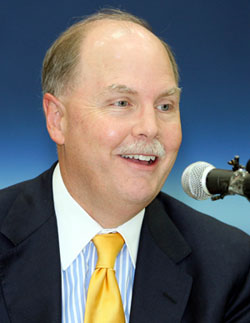
DETROIT – General Motors Co. President and CEO Fritz Henderson calls the auto maker’s decision to back out of a deal to sell a majority stake in its Adam Opel GmbH unit to Canadian parts supplier Magna International Inc. “difficult” but “strategic,” and says fractured relations with German labor unions can be fixed.
“We have a reaction, which in many ways is understandable,” Henderson tells Ward’s during an interview at GM world headquarters earlier today. “We have to re-engage with our people, with our dealers, our suppliers, with responsible parties in Europe and particularly Germany to repair relations.”
GM’s board decided yesterday to kill a deal with Magna and Russian investment partner OAO Sberbank that would have given them an equal share of 55% of Opel. GM was to retain 35% and a 10% share was slated for Opel employees.
The German government, hoping to save some 25,000 Opel jobs at sites in the country, or roughly half of the auto maker’s employment in Europe, threw E4.5 billion ($6.8 billion) behind the deal.
But with economic conditions improving globally, especially in GM’s home market, the auto maker’s new board determined holding onto Opel and its U.K. sister Vauxhall would be best for its business.
“The conclusion was, it was in the best interest of GM in Europe and Opel/Vauxhall to restructure the business the right way and do it as part of GM,” Henderson says.
Henderson also alludes to the importance of Opel’s research and engineering to GM’s broader operations, and “the simple conclusion was we have the capability of doing this with Opel as part of GM.”
A severe global recession drove GM into bankruptcy, limiting its ability to undertake a costly restructuring of Opel, also struggling to stay viable. Even just two months ago, “an enormous amount of uncertainty” remained in the U.S. market, Henderson says. GM exited bankruptcy four months ago.

Henderson says the auto maker and its board have a clearer picture today of GM’s financial condition, leading to the Opel decision.
“The understanding is much better today than it was just two months ago over where we are and where we’re going,” he says.
Henderson declines to say whether GM’s plan for turning around Opel is more or less aggressive than Magna’s.
GM in a statement today says it wants to cut costs 30% at Opel, which would mean the loss of about 10,000 jobs. Magna’s proposal was similar.
“The company needs to be restructured; whether it was the plan Magna was pursuing or any other plan on the table, every plan had in its base a need to restructure capacity, to restructure operations,” Henderson says.
How receptive Opel’s union and the German government will be to GM’s plan remains to be seen. Organizers today called for work stoppages to protest the decision, and German Chancellor Angela Merkel may take the topic up with President Obama.




